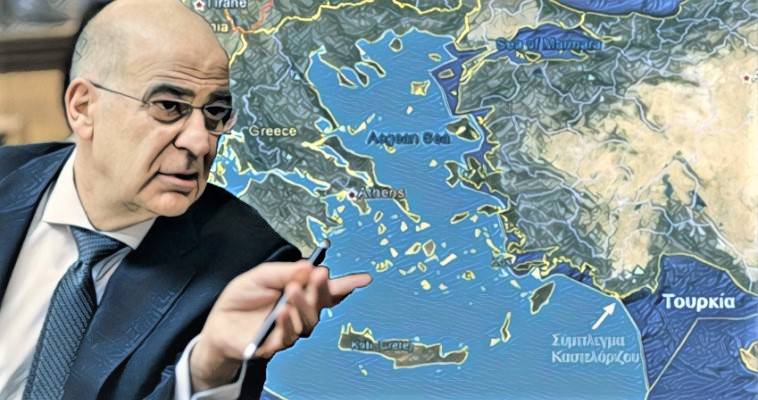Stavros Lygeros: Making 12 mile territorial waters the rule – Excepting only the eastern Aegean
21/01/2021
The Hellenic Parliament voted to close the bays with baselines and to extend the territorial waters to 12 miles in the Ionian Sea to Tainaro. The Foreign Minister, in fact, announced in advance that the territorial waters will be extended around Crete, not only in the south, but also in the east. Why not in the north of Megalonisos?
We remind that leaving the Ministry of Foreign Affairs (October 2018), Kotzias had referred to his decision to extend the territorial waters from Othonios (north of Corfu) to Antikythera. He had stated his intentions, in fact, during his interview with ERT in December 2017. However, until he left the Ministry of Foreign Affairs, he had not taken the relevant step. Neither did his successor Katrougalos.
According to the Law of the Sea, each coastal state has the right to unilaterally extend its territorial waters up to 12 miles. If Greece exercised its right, it would largely nullify Turkish expansionist claims. International waters in the Aegean would be drastically reduced, so a very large part of it would become a Greek sea.
Among other things, the importance of the continental shelf-EEZ demarcation in this area would be limited, since relatively small areas (mainly in the northern Aegean and less in the north of Crete) would be left for demarcation. For this reason, the Turks had hurried to prevent Athens from exercising its legal right, characterizing as a cause of war (casus belli) the expansion of Greek territorial waters in the Aegean.
In June 1995, the Turkish National Assembly authorized the government to take even military measures to prevent it. They were aware that if there was an expansion, they would lose their expansionist game in the Aegean. At the same time, the Greek position in the Eastern Mediterranean would be significantly strengthened. Athens declares that it retains its full right to expansion and will exercise it whenever it sees fit. This is a sham position. When a right is not exercised for many years, as in our case, it is weakened, its exercise becomes more and more difficult.
Territorial waters with differing widths
It should be noted that the governments of Simitis, Costas Karamanlis, George Papandreou, and Tsipras, in the context of past exploratory contacts, have negotiated with Ankara the extent of Greek territorial waters. This is despite the fact that (according to international law) this is a right that every coastal state exercises unilaterally. That is, it has no obligation to negotiate it with neighboring states.
Since the 2000s, I have written: “Since Athens has wrongly chosen to negotiate with Ankara the extent of Greek territorial waters, at least let it negotiate properly. Athens should have from the beginning extended its territorial waters to 12 miles to all areas not adjacent to Turkey and then negotiated with Ankara a compromise on the extent of Greek territorial waters in neighboring areas”.
If it had done so, the non-neighboring sea areas would have been out of the negotiations, while now Ankara is asking for no expansion in the eastern Aegean, offering (?) In exchange the acceptance of the expansion in the Ionian and Libyan seas! In other words, it offers what Greece can do on its own, without Turkey having the slightest pretext for reaction since it is not adjacent to these sea areas “. I have repeatedly stated this position in articles and included it in the section “Twelve miles and the casus belli” in the book “After Erdogan what?” (April 2013, Patakis publications).
A pretentious position
For years, the prevailing view was that if the territorial waters were extended only in certain areas, it would be like Greece admitting that the Aegean is a special sea. Therefore, it would give substance to the Turkish claim that special arrangements should apply. The argument would be debatable if Athens had not already accepted the formula of territorial waters of different range by region and was determined to go to 12 miles. The Greek governments negotiated it not because they consider the Aegean a special sea, but because they succumbed – without admitting it – to the blackmail of the Turkish casus belli.
This is the reality and does not change through the official rhetoric of Greece that it will expand its territorial waters whenever it sees fit. When it is afraid to exercise its right and when territorial waters of different ranges have already been negotiated, the above argument is a sham. The real cause is the phobic syndrome of the Greek political elite, its reluctance to do anything that would bother Ankara and could potentially lead to a crisis.
It should be noted that Turkey has 12 miles of territorial waters in the Black Sea and its southern shores (Eastern Mediterranean). It does not, of course, extend them to the Aegean, because it would not have a significant benefit and mainly because if it did extend them, it could not prevent Greece from doing the same.
Twelve miles is the rule
For Greece is not enough to expand its territorial waters to 12 miles in the Ionian and southern Peloponnese, nor is the expansion announced by Dendias south and east of Crete enough. Why not expand to northern Crete and the western Aegean, but also in Macedonia-Thrace. After Athens entered into negotiations with Ankara for Greek territorial waters, let it leave for negotiation only the territorial waters of the islands in the eastern Aegean.
And of course, Greece must be generous in establishing free navigation corridors, in order to reduce any reservations of states whose warships circulate in this sea. After all, it has already done so in the Cyclades Sea, where even with six-mile territorial waters, due to geography, there are no international waters.
If Athens does not include in the expansion the aforementioned areas of the Aegean, Athens will have succumbed to the blackmail of the casus belli, implicitly but clearly accepting that Ankara has a say in those areas as well. Conversely, if 12-mile territorial waters are secured everywhere, with the exception of the islands of the eastern Aegean, any informal negotiation with Ankara would involve a compromise there, ie 8-10-mile territorial waters. I had repeated the above argument in 2018 in my article “Territorial waters: good five in hand, but not only in the Ionian”.
The hesitancy of the past for territorial waters
The current situation is suitable for closing the bays with baselines everywhere and for extending the territorial waters to 12 miles everywhere, except the islands of the eastern Aegean. This is because the Erdogan regime is trying to play the “nice guy” in view of the EU March Summit, but mainly until it finds out what the Biden administration has in mind for US-Turkish relations.
If Athens takes the step, in the worst-case Erdogan will abandon the exploratory contacts, assuming the cost, and if the territorial waters to expand everywhere, except in the eastern Aegean, in the current situation Erdogan will probably send the Oruc Reis to 7-8 miles from the coast in Greek territorial waters. In other words, he will challenge Greece to protect its territorial waters this time and not a potential EEZ, as happened in the summer south of Kastellorizo.
The hesitation of the past turned a then diplomatically manageable problem into a difficult one today. Until 2013, Ankara had not raised the claims it is making today. The “Blue Homeland” was not yet a state dogma, and Erdogan was much more restrained because he faced civil wars, first with the post-Kemalist regime and later with the Gulen movement.
Greece should extend its territorial waters everywhere, except the eastern Aegean, but it would be appropriate to have entered into a military assistance agreement with France and even better to have a Mediterranean alliance with the participation of Egypt, the Emirates, and indirectly except clearly with Israel. Such an alliance would change the balance of the Eastern Mediterranean. This is not an easy task, but it is worth exhausting all the opportunities to do so.





